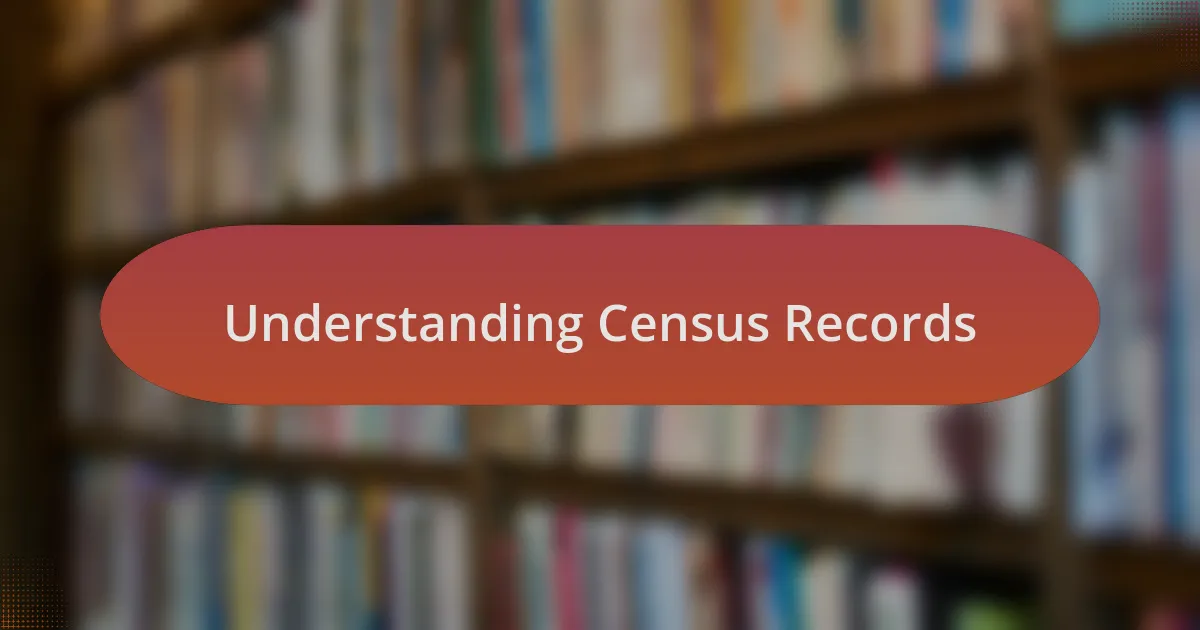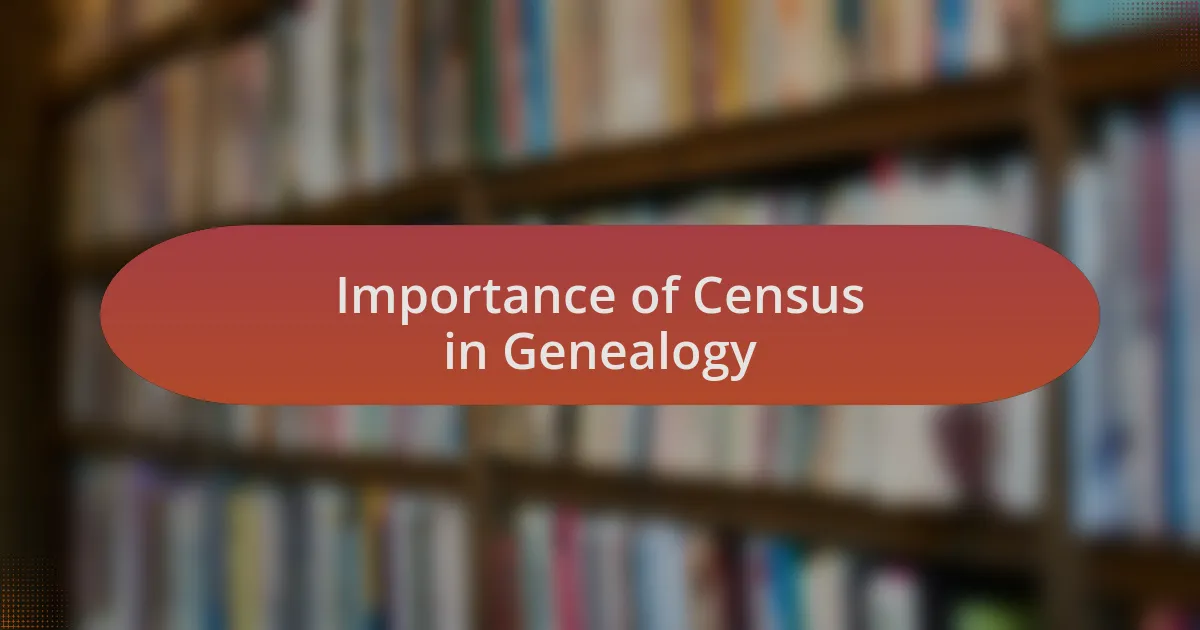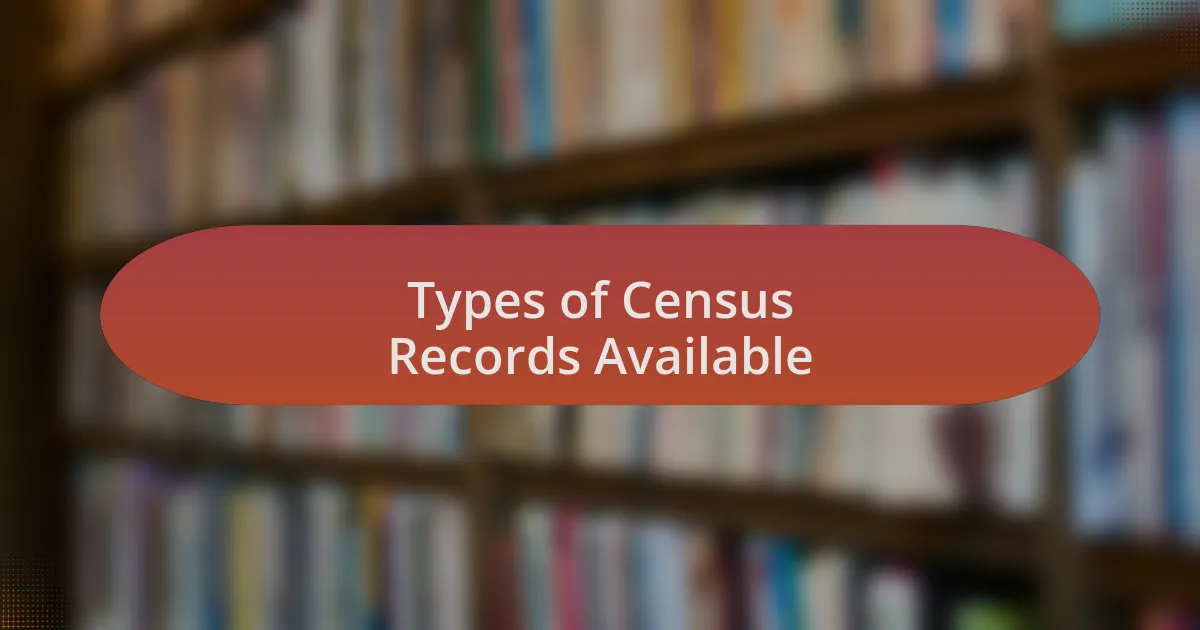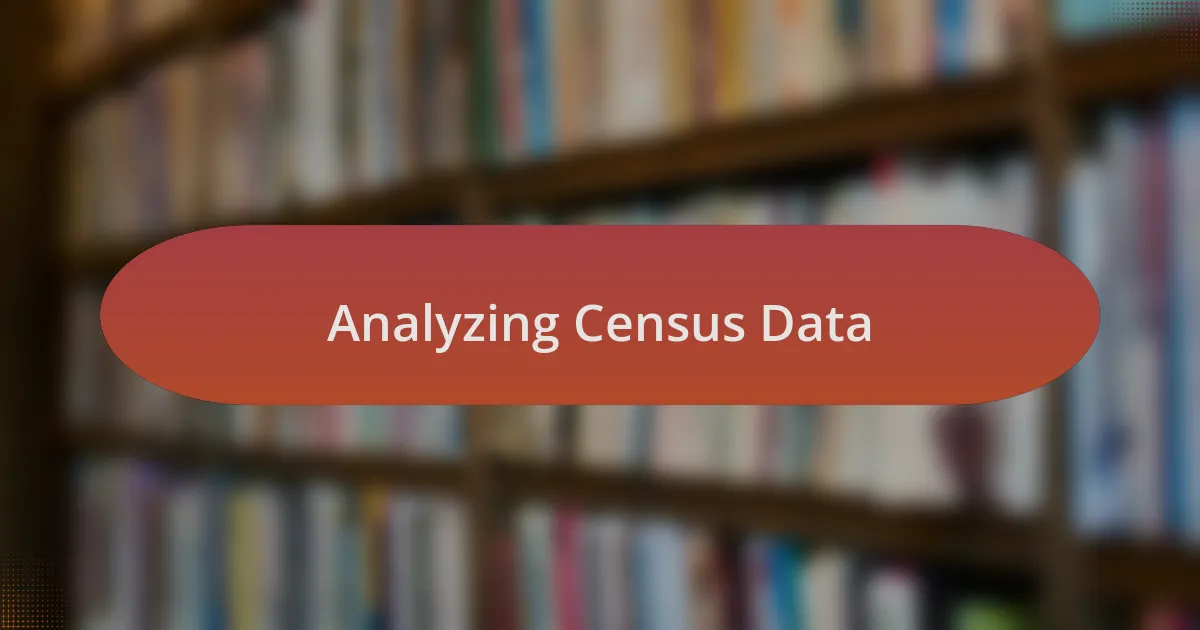Key takeaways:
- Census records provide crucial insights into familial connections, migration patterns, and social status, enhancing genealogical research.
- Accessing census data can be done through digital platforms, local archives, and genealogy societies, which may offer additional support.
- Analyzing census data beyond basic details, like household composition and historical context, can uncover deeper family narratives and insights.
- Personal discoveries from census records can reshape understanding of family dynamics and reveal unexpected connections with relatives.

Understanding Census Records
Census records serve as a snapshot of a community at a specific moment in time. When I first examined my family’s census entries, I was amazed by how much could be gleaned from a simple list of names, ages, and occupations. It’s almost like uncovering secrets; each column represents a layer of my ancestors’ lives, creating a richer understanding of their everyday realities.
I remember poring over a particularly intriguing census from 1900, where I found distant relatives listed together in a household that wasn’t immediately familiar to me. It made me question how they all ended up living under one roof. This curiosity led me down a rabbit hole of family stories and connections I never knew existed, demonstrating how rich these records can be for piecing together familial ties.
While census data can be enlightening, it’s essential to approach it with a critical eye. For example, the accuracy of the information can often depend on who provided it and their knowledge at the time. Have you ever encountered a name misspelling or a confusing age discrepancy? These details can paint a different picture than intended, so diving deeper into the context surrounding the census can really enhance our understanding of those gathered within its pages.

Importance of Census in Genealogy
Census records are invaluable for anyone delving into genealogy, as they provide critical information that can link generations. I recall the moment I discovered my great-grandmother’s entry, where her birthplace was listed for the first time. It felt like unlocking a door to another part of her life and connecting me to relatives I never knew existed. How often do we overlook the importance of such seemingly simple details?
The demographic insights offered by census records can illuminate patterns in migration and social status within families. When I traced my ancestors’ paths over different decades, I found surprising patterns of movement that told a story of resilience. It’s fascinating to see how the larger economic and social contexts influenced individual lives—doesn’t that give you a deeper appreciation of your family’s journey?
Census records also serve as a timeline that can help validate other historical resources. I once had conflicting information about my ancestors’ lives from family stories and church records. But the census data provided a clear timeline that helped resolve discrepancies, showing how these records can be the backbone of genealogical research. Isn’t it reassuring to know that these documents can help us stitch together the fabric of our family histories?

Types of Census Records Available
Census records come in various formats that can cater to different research needs. For example, federal census records in the United States are conducted every ten years and are a treasure trove of information; they’re often the first stop for genealogists like myself. I vividly remember scouring through the 1910 census and uncovering unexpected family connections that I never anticipated.
Another type of census record is state or local censuses, which may occur between federal counts. I once stumbled upon a local census that listed my ancestors in between the federal records, which filled in gaps and provided clarity around their lives. Have you ever thought about how these smaller, more detailed surveys could shine a light on your family’s story?
Finally, there are special censuses, like agricultural or industrial censuses that provide insights into specific aspects of life during certain periods. When I reviewed the agricultural census for my family’s farm, I gained a deeper understanding not only of their struggles but also of their triumphs. Isn’t it intriguing how these specialized records can unveil layers of your ancestry that more general records might overlook?

How to Access Census Records
Accessing census records requires knowing where to look and what resources are available. Many of the federal census records are digitized and can be found on popular genealogy websites like Ancestry.com or FamilySearch.org. I remember the excitement I felt when I first logged into one of these sites and did a simple search; within minutes, I had a tangible connection to my ancestors’ pasts right at my fingertips.
Another approach is visiting local archives or libraries where hard copies of census records are stored. I once visited a state library that had an extensive collection, and the thrill of flipping through the yellowed pages made history come alive. Have you ever held a piece of paper that bore the names of your ancestors? It creates a sense of connection that nothing else can replicate.
Don’t overlook the possibility of reaching out to genealogy societies or historical societies in the areas where your ancestors lived. These organizations often have resources and volunteers who can assist you, and I can’t tell you how many hidden gems I uncovered thanks to their help. It’s these little connections with others in the genealogy community that can make your research journey even more rewarding.

Tips for Effective Record Searching
When searching through census records, it’s essential to be flexible with names and spellings. I recall a time when I was convinced I had hit a dead end because my ancestor’s name was recorded differently than I’d expected. Using wildcards in searches can often illuminate paths I hadn’t considered. Have you ever found yourself missing a clue simply because the spelling wasn’t quite right? I know I have, and it taught me the importance of thinking outside the box.
It’s also beneficial to gather context about the time and place your ancestors lived in. I once researched my great-grandfather and discovered he lived in an area with unique historical events that impacted the census data. Understanding local history allowed me to appreciate his story better and even helped me find additional records that deepened my family narrative. Have you ever uncovered details about your ancestors’ surroundings that changed your perspective on their lives?
Lastly, don’t hesitate to make notes as you search. Creating a timeline of important facts and dates can reveal patterns or relationships that might not be immediately apparent in the records alone. I remember piecing together several scattered census records and, suddenly, the puzzle of my family’s history began to fit together beautifully. Keeping thorough notes has made my research more manageable and rewarding. How do you keep track of your findings during your genealogical journey?

Analyzing Census Data
Analyzing census data requires more than just looking at the numbers. I remember getting bogged down in the dry details of my ancestor’s age and birthplace, but it wasn’t until I examined the social columns—like occupation and household composition—that the data began to tell a story. Have you ever paused to consider how the relationships listed in a household might inform the dynamics of family life at that time? Exploring these aspects can truly breathe life into the stark statistics.
It’s also essential to think critically about the context in which the census was conducted. I found it enlightening to compare the years my ancestors were counted to significant events—like wars or economic downturns. For example, studying the 1930 census offered critical insights into how the Great Depression impacted my family’s livelihood. Has analyzing the historical context of your ancestors’ data provided unexpected layers to your understanding of their experiences?
Moreover, be alert to inconsistencies within the census records themselves. There was a moment when I picked up on discrepancies in ages listed for one ancestor across different decades. This initially worried me, but it motivated me to dig deeper and explore how life events might lead to such differences, prompting further research into their life story. Have you ever found something surprising in your analysis that made you rethink what you thought you knew?

Personal Anecdotes and Success Stories
When I first delved into the census records for my grandmother’s family, I stumbled across a fascinating entry that revealed she wasn’t living with her parents as I had assumed. Instead, she was listed with an aunt and uncle, which prompted me to wonder about the family dynamics of that time. Have you ever unearthed something that completely shifted your understanding of your family history? This discovery led me on a journey to explore why she might have been living away from her immediate family and the relationships involved.
One of my most gratifying moments came when I tracked down my great-great-grandfather in the 1900 census. By cross-referencing the data with local historical archives, I found a record of a community meeting he attended, which connected him to a larger social movement. It was incredible to realize that not only did I share his name, but I also inherited a passion for social justice that seemed to echo through generations. Isn’t it amazing when census records can reveal more than just names and dates?
In another instance, I discovered that my distant cousin was listed in the same household as my direct ancestor in the census despite being unknown to my family. After reaching out with curiosity and a shared history, we were able to piece together our connection, leading to a collaboration that has further enriched both of our genealogical explorations. Have you ever connected with a relative through records, only to find that this relationship has opened new doors in your research? It’s this kind of discovery that makes working with census records so rewarding.